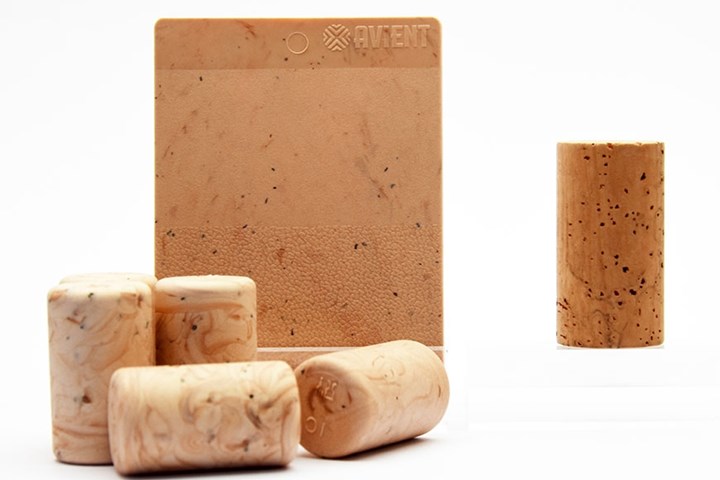Special-Effect Masterbatch for Natural-Looking Plastic Wine Corks
Prototype TPE corks made with Avient’s new Renol and Remafin masterbatch that create natural-looking TPE corks gets positive reviews at recent trials.
A new special-effect masterbatch package that enables production of natural-looking wine corks made of thermoplastic elastomer (TPE) has been launched by Avient. Offered under the Renol and Remafin brands, the masterbatch was developed by Avient ColorWorks in Merate, Italy. Prototype corks utilizing this special effect formulation in combination with TPE from Italian compounder Marfran Srl were trialed at a manufacturer to prove the concept of creating a more natural-looking wine cork.
According to Francesco Francheschetti, president of Marfran Srl (formerly Francesco Franceschetti Elastomeri), initial testing of the protoype focused on a family of TPE compounds already used in the wine cork market. “The new masterbatch package from Avient enables us to enter the wine cork market with a Marfran TPE and foaming agent that complies with the necessary food contact requirements and the visual effect of genuine cork. It also allows us to deliver good moldability and resistance to sterilization. The first trials by some of the main participants in the wine cork market have been very positive.”

The new masterbatch package has been shown to produce a special effect that makes every TPE cork look different, with a unique light brown swirl pattern and random black specs, convincingly mimicking the look of natural cork. new masterbatch formulations comply with applicable FDA and EU food-contact standards. Corks can be produced using existing injection molding technology, and are price-competitive with their natural counterparts.
Explained ColorWorks polymer scientist Daniele Conti, “Several trends are pushing the wine industry to find alternatives to natural cork. Climate change and related drought events are reportedly hindering the growth rate of cork trees, and supplies are limited. Natural cork, and even corks made of ground natural material, can allow oxygen to enter the bottle, occasionally spoiling the wine. TPE corks don’t have these problems, but they are obviously synthetic substitutes and don’t give wine enthusiasts the same aesthetic experience as the natural product. We have been able to develop a special-effect masterbatch that makes a natural-looking TPE cork, providing the aesthetic pleasure of natural cork together with the improved performance of TPE.”
Related Content
-
Riverdale Global Showing Latest Innovations and New Satellite Location in Wisconsin
NPE2024: Live demos of updated RGS controller are among the highlights at its Wisconsin facility that will house the ‘new’ color R&D lab.
-
SI Group Gets FDA Approval Extension for Weston 705 & 705T
SI’s phosphite antioxidants get ‘green light’ for use in PET food-contact packaging
-
‘Eco-Friendly’ Foaming Agent Masterbatch
CAI Performance Additives’ ST-BA13MB boasts reliable foaming results across various volume thermoplastics


